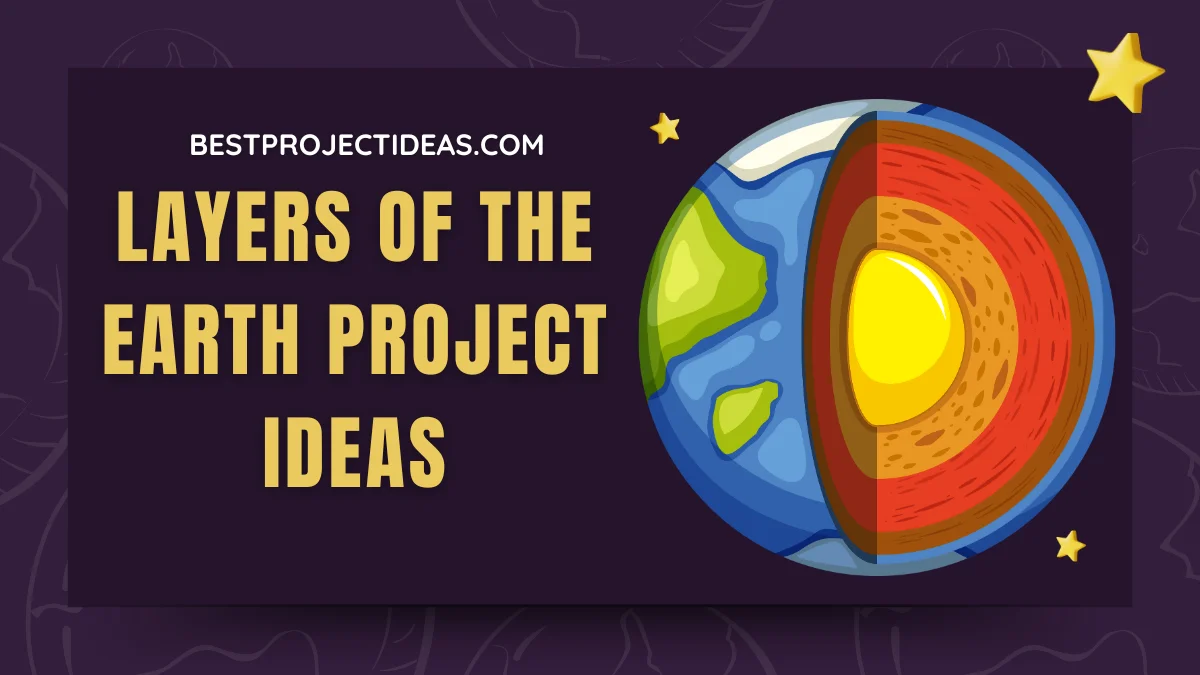
Discovering Earth’s layers is like going on a cool adventure! Our planet has different parts hidden deep inside, like a giant onion. The Layers of Earth project helps kids learn about how the world is built from the inside out.
We walk onto the super-hot core from the hard crust, and each layer has its job. Kids can make models, draw, or even bake to show these layers. This hands-on way of learning makes it fun and easy to understand how the Earth works. Get ready to explore and learn all about our amazing planet with these fun projects!
Must Read: 121+ Trending Recycled Robot Project Ideas For Students
What Are The Layers Of The Earth Idea?
The Earth has several layers, each with its traits. The outer layer is the thin crust. Next is the mantle, which is the largest part of Earth. Below the mantle is the liquid outer core below the mantle, made mostly of iron and nickel, which creates Earth’s magnetic field.
At the very center is the solid inner core, also made of iron and nickel, under a lot of pressure and heat.
Scientists also talk about other parts like the rigid lithosphere (which includes the crust and upper mantle) and the soft, partly melted asthenosphere beneath it. Learning about these layers helps explain things like earthquakes and volcanoes.
What Are The Major Layers of the Earth?
Let’s go over some key facts about Earth’s layers.
1. Crust
- The thinnest, outermost layer (5-70 km thick)
- Oceanic crust: Dense, thin, made of basalt (5-10 km)
- Continental crust: Less dense, thicker, made of granite (30-70 km)
2. Mantle (2,900 km thick)
- Upper mantle:
- Includes the asthenosphere, which is partially molten
- Helps plates move
- Goes down to about 670 km deep
- Lower mantle:
- Solid but flows very slowly
- Reaches the core boundary
3. Core (3,475 km radius)
- Outer core:
- Liquid iron-nickel
- Makes Earth’s magnetic field through the dynamo effect
- Inner core:
- Solid iron-nickel
- Super hot (5,400°C)
- High pressure keeps it solid, even at such a high temperature
Layers Of The Earth Project Ideas
Here are the top layers of the Earth project ideas for students to try in 2024:
Art and Craft Projects:
- Clay model with removable layers
- Painted rock earth layers
- Papier-mâché globe cross-section
- Layered sand art bottle
- Colored paper collage earth
- Felt fabric layer book
- Yarn-wrapped earth core model
- Edible earth layer cake
- Stained glass earth window
- Layered crayon melting art
- Cardboard tube earth model
- Popsicle stick layer display
- Egg carton earth layers
- Pipe cleaner core model
- Playdough earth cross-section
- Tissue paper layer globe
- Beaded earth layer bracelet
- Layered earth slime jar
- Painted wooden disc layers
- Origami Earth Layer book
Science Experiments:
- Density layer liquid test
- Earth layer temperature comparison
- Pressure simulation using balloons
- Rock formation demonstration
- Convection currents in liquids
- Magnetic field detection activity
- Seismic wave propagation model
- Core sample extraction simulation
- Layer erosion water experiment
- Plate tectonics puzzle game
- Earth’s rotation demo model
- Gravity well marble experiment
- Layer composition analysis activity
- Earth’s Atmosphere Layer demo
- Core cooling crystallization experiment
- Mantle convection lava lamp
- Earthquake shake table test
- Volcanic eruption science project
- Soil permeability comparison test
- Earth’s magnetic field visualizer
Digital and Technology Projects:
- 3D-printed earth layer model
- Augmented reality Earth app
- Animated earth layer video
- Interactive Earth Layer website
- Earth layer computer game
- Virtual reality Earth tour
- Earth layer infographic design
- Stop-motion earth formation video
- Earth layer quiz app
- Digital earth layer poster
- Minecraft Earth layer world
- Earth layer screensaver program
- Layered earth 3D hologram
- Earth core simulation software
- Layer depth calculator app
- Earth layer sound experience
- Digital earth layer flashcards
- Earth layer data visualization
- Robotic earth layer model
- Earth layer projection mapping
Writing and Literature Projects:
- Earth layer acrostic poem
- Journey to center story
- Earth layer fact book
- Layer-themed crossword puzzle
- Earth’s history timeline writing
- Layer-inspired shape poems
- Earth Core Adventure novel
- Layer facts trading cards
- Earth formation comic strip
- Layer exploration diary entries
- Earth layer tongue twisters
- Core-to-crust recipe book
- Earth layer trivia game
- Layer-themed word search puzzle
- Earth’s Secrets Mystery story
- Layer-by-layer instruction manual
- Earth core myth writing
- Layer facts fortune teller
- Earth layer alphabet book
- Core-to-crust travel brochure
Music and Performance Projects:
- Earth layer song composition
- Layer-themed interpretive dance
- Earth formation musical play
- Core-to-crust rap performance
- Layer sound effects creation
- Earth layer rhythm exercise
- Core vibration music piece
- Layer-inspired instrument making
- Earth Formation silent film
- Layer depth tone experiment
- Core heat beat composition
- Earth layer sound installation
- Layer-themed puppet show
- Core pressure sound sculpture
- Earth layer lip sync
- Layer density pitch study
- Core-to-crust sound journey
- Earth layer beatbox routine
- Layer-inspired musical notation
- Core rumble audio recording
Math and Measurement Projects:
- Earth layer proportion calculation
- Core temperature graphing activity
- Layer thickness measurement project
- Earth mass distribution chart
- Layer volume comparison study
- Core pressure calculation exercise
- Earth radius estimation activity
- Layer density ranking project
- Core-to-crust distance scale model
- Earth layer percentage wheel
- Layer depth conversion practice
- Core size comparison chart
- Earth layer ratio exploration
- Layer weight estimation game
- Core rotation speed calculation
- Earth layer area measurement
- Layer thickness pie chart
- Core density word problems
- Earth layer fraction model
- Layer temperature line graph
Geography and Mapping Projects:
- Earth layer relief map
- Core location plotting activity
- Layer boundary world map
- Earth crust thickness chart
- Tectonic plate movement map
- Core sample location tracker
- Layer depth contour map
- Earth’s inner heat map
- Earthquake depth plotting project
- Core magnetic field map
- Layer composition world map
- Earth’s gravity anomaly chart
- Volcanic activity layer map
- Core convection current diagram
- Layer transition zone map
- Earth’s seismic wave map
- Mantle plume location chart
- Core-mantle boundary map
- Layer pressure gradient diagram
- Earth’s internal structure atlas
Environmental Science Projects:
- Layer pollution impact study
- Earth’s carbon cycle model
- Core energy potential chart
- Layer resource distribution map
- Earth’s water cycle diagram
- Core heat effects project
- Layer biodiversity impact study
- Earth’s nutrient cycle model
- Core magnetic field protection
- Layer erosion prevention plan
- Earth’s oxygen cycle diagram
- Core energy harvesting proposal
- Layer contamination tracking project
- Earth’s Nitrogen Cycle Model
- Core cooling effects study
- Layer conservation strategy plan
- Earth’s phosphorus cycle diagram
- Core composition change tracker
- Layer ecosystem impact assessment
- Earth’s sulfur cycle model
Chemistry Projects:
- Layer element composition chart
- Core chemical reaction simulation
- Earth’s Mineral Formation Diagram
- Layer decomposition experiment model
- Core isotope distribution map
- Earth’s chemical gradient study
- Layer pH level comparison
- Core element state chart
- Earth’s oxidation process model
- Layer chemical weathering diagram
- Core fusion reaction simulation
- Earth’s crystallization process study
- Layer gas composition analysis
- Core element abundance chart
- Earth’s radioactive decay model
- Layer chemical bond diagram
- Core temperature-pressure phase chart
- Earth’s Elemental Cycle Study
- Layer chemical equilibrium model
- Core nuclear reaction simulation
Physics Projects:
- Layer density gradient model
- Core gravitational field diagram
- Earth’s centrifugal force demonstration
- Layer pressure distribution chart
- Core magnetic dynamo simulation
- Earth’s moment of inertia
- Layer thermal conductivity comparison
- Core angular momentum calculator
- Earth’s seismic wave diagram
- Layer viscosity experiment model
- Core convection current simulator
- Earth’s rotational energy chart
- Layer elastic rebound theory
- Core Coriolis effect demonstration
- Earth’s isostatic adjustment model
- Layer friction heat diagram
- Core electromagnetic field generator
- Earth’s gravitational potential energy
- Layer shear stress model
- Core plasma state simulator
Astronomy Projects:
- Earth layer comparison chart
- Core formation timeline diagram
- Layer thickness planetary comparison
- Earth’s internal heat budget
- Core composition space perspective
- Layer evolution geological timeline
- Earth’s magnetic field model
- Core dynamo planetary comparison
- Layer density exoplanet study
- Earth’s internal structure poster
- Core temperature stellar comparison
- Layer pressure astronomical scale
- Earth’s gravitational field map
- Core energy cosmic perspective
- Layer formation universal timeline
- Earth’s rotational effects diagram
- Core size planetary ranking
- Layer transition space analogy
- Earth’s interior cosmic poster
- Core dynamics stellar comparison
Biology Projects:
- Layer microorganism distribution chart
- Core extremophile habitat model
- Earth’s biosphere depth diagram
- Layer fossil record timeline
- Core bacteria adaptation study
- Earth’s biogeochemical cycle model
- Layer ecosystem vertical profile
- Core life possibility exploration
- Earth’s biomass distribution chart
- Layer biodiversity depth graph
- Core energy and life
- Earth’s subsurface biosphere model
- Layer symbiosis depth study
- Core heat and evolution
- Earth’s deep life network
- Layer microbial activity chart
- Core pressure adaptation diagram
- Earth’s Biofilm Depth Model
- Layer nutrient cycle depth
- Core-driven evolution theory
Engineering Projects:
- Layer drilling technology model
- Core heat energy harvester
- Earth’s internal structure probe
- Layer stability construction diagram
- Core pressure-resistant material
- Earth’s layer exploration robot
- Layer permeability barrier design
- Core simulation chamber blueprint
- Earth’s layer monitoring system
- Layer-specific tool development
- Core sample extraction device
- Earth’s layer imaging technology
- Layer-adaptive construction technique
- The core data transmission system
- Earth’s layer analysis equipment
- Layer-specific sensor development
- Core energy conversion technology
- Earth’s layer mapping drone
- Layer-based foundation design
- Core material synthesis reactor
History and Archaeology Projects:
- Layer formation timeline poster
- Core evolution history chart
- Earth’s Layer Discovery Timeline
- Layer theory development diagram
- Core Exploration historical map
- Earth’s structure understanding progression
- Layer dating method comparison
- Core composition discovery timeline
- Earth’s age-determination methods
- Layer observation tool evolution
- Core theory historical debate
- Earth’s structure and ancient beliefs
- Layer study cultural comparison
- Core Myth Global collection
- Earth’s interior historical texts
- Layer knowledge progression chart
- Core exploration technology timeline
- Earth’s structure and philosophical perspectives
- Layer study historical figures
- Core theory paradigm shifts
Sociology and Culture Projects:
- Layer symbolism cultural study
- Core Beliefs Global survey
- Earth’s structure and religious perspectives
- Layer-inspired architecture around the world
- Core Myths Cultural comparison
- Earth’s interior literary references
- Layer metaphors in language
- Core-inspired art through the ages
- Earth’s Structure Societal Impact
- Layer knowledge socio-economic study
- Core Exploration of Public Perception
- Earth’s interior in media
- Layer-based cultural practices survey
- Core symbolism in rituals
- Earth’s structured educational approaches
- Layer terminology linguistic study
- Core concepts in philosophy
- Earth’s interior political implications
- Layer study career paths
- Core research funding analysis
What Are Some Fun Facts About The Layers Of The Earth?
Here are some amazing facts about Earth’s layers!
- The inner core is made of solid iron and nickel, and it’s even hotter than the Sun’s surface. It’s around 9,800°F, while the Sun’s surface is about 9,000°F.
- The outer core spins a bit faster than the rest of Earth. This movement, called “westward drift,” helps create Earth’s magnetic field.
- The mantle takes up 84% of Earth’s volume, but we’ve only drilled about 7.5 miles into it—that’s less than 1% of the way through!
- The oceanic crust is thinner than the continental crust. It’s about 3-6 miles thick under oceans, while it’s 20-30 miles thick under land.
- The boundary between the crust and the mantle is called the Mohorovičić discontinuity, or “Moho,” where seismic waves change speed.
Sucessful Case Studies Of Layers Of The Earth Project Ideas
These examples show creative ways to learn about Earth’s structure:
- Interactive 3D Model: A high school in California built a 3D model of Earth’s layers with papier-mâché and electronics. Students made removable layers with LED lights and sensors. When a layer was removed, info appeared on a screen. This project won a state science fair and helped teach younger students.
- Edible Earth Layers: A school in the UK taught Earth’s layers using gelatin in clear cups. Each colored layer represented a part of Earth’s structure, from the core to the crust. This fun and tasty method helped students remember better.
- Augmented Reality Earth Layers App: Middle school students in Japan created an app to explore Earth’s layers with augmented reality. By pointing a device at a marker, users could interact with 3D Earth layers, seeing info and tectonic movements. The app won an award and is used in schools.
- Earth Layers Quilt Project: Textile and geology students in Canada made a quilt showing Earth’s layers, using fabrics to match each layer’s features. It’s displayed in a university and continues to teach visitors.
- Virtual Reality Earth Core Expedition: A high school in Australia made a virtual reality trip through Earth’s layers. Students used VR headsets to experience the layers’ temperatures and pressures. Quizzes and games helped improve test scores and interest in geology.
Also Read: Top 300 Frontend Project Ideas For Students 2024
Wrap Up
Layers of the Earth project ideas are a fun way to learn how our planet is built. These projects help kids understand the Earth’s parts in a simple and hands-on way.
Students can see how everything fits by making models, drawing pictures, or creating books about the Earth’s layers. These activities help kids remember the crust, mantle, and core. Doing these projects can spark an interest in science and geology.
It’s cool to think about what’s deep under our feet! Whether using clay, paper, or food, exploring the Earth’s layers through projects makes this big idea easier to understand. Layers of the Earth project ideas turn a tricky topic into a fun adventure for kids.

